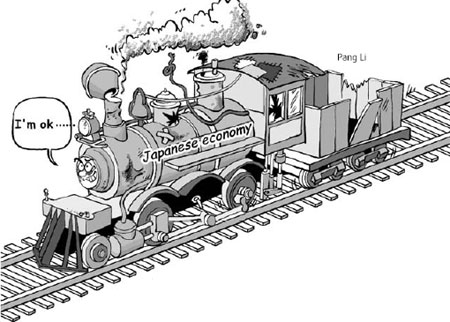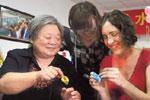Feng Zhaokui
Times bad for Japan, but worst may be over
Updated: 2009-06-05 07:52
By Feng Zhaokui (China Daily)
The Japanese economy has shrunk for four consecutive quarters, with things worsening in the first quarter of this year. Official statistics released on May 20 show the Japanese GDP dropped by a staggering rate of 15.2 percent a year in the first quarter, a record since World War II. Almost all the developed economies suffered negative growth in the first quarter, but Japan led the economic contraction - the US economy shrunk by 6.1 percent, the Euro Zone by 10 percent and Germany by 14.4 percent.
When Japan suffered a prolonged bout of recession in the 1990s, its media painted pessimistic pictures, saying the "Japanese economy has been defeated" and "Japan is like a sinking Titanic". As the Japanese economy struggles through its worst post-WWII period, it is not surprising to hear Kyodo News Agency saying it has suffered a "total collapse" and is "trapped in an unprecedented plight".
But has the Japanese economy indeed suffered a "total collapse"? If the economy shrinks in the three remaining quarters, too, it will end with a double-digit contraction for the whole of the year. And if that happens it would be no exaggeration to say it has"collapsed totally".
Judging from the current trend, however, the second quarter may not be as bad as the first. In fact, it is possible that it could see a growth. This optimism is based on the followings factors.
First, the monthly data show several important economic indices have been improving since March. Japanese Ministry of Finance figures show the export volume index plunged from July last year to this February, but it grew 3.4 percent in March.

Energized by improving exports, the industrial and mining production index, which saw a double-digit decline between September 2008 and February 2009, grew 1.6 percent in March. Experts say the index could have risen faster in April and May perhaps because positive changes have made the market more confident about the economy bottoming out soon. Ironically, the Nikkei rose slightly the day the record GDP contraction figure was announced.
Second, inventory adjustment will soon stop dragging Japan's GDP down. Last fall, falling exports led to excess inventory, forcing enterprises to cut production rigidly in the past two quarters to a level below ultimate demand. And in the first quarter of this year, de-inventory dragged the GDP down by 3 to 4 percent.
But now inventory has returned to a reasonable level, creating space for production to be increased to the ultimate demand level in the second quarter. In fact, inventory adjustment started bearing results in March. And investments in inventory, which exacerbated the plunge in the first quarter, are expected to contribute to growth in the second quarter.
Third, the Japanese government has announced a series of policies to deal with the crisis. It amended the Act on Special Measures for Strengthening Financial Functions to build a solid defense line to protect financial institutions that have not yet been battered severely. Experts argue that the effects of the policies have become gradually evident since the new financial year began on April 1. Some of them hope government stimulus plans such as tax cuts for eco-friendly cars and discounts on home appliances would work in the second quarter.
Fourth, export touched rock bottom in the first quarter - a 26 percent drop from the previous quarter. A decline in exports makes consumption sluggish, further exacerbating a slump. Since the major economies of the world are trying to boost domestic demand, the worst could very well be over for Japanese exports. Exports may continue to fall in the second quarter, but its rate will be less than that in the first.
Last but not the least, we need to understand the basics of the Japanese economy. The country's GDP has shrunk, but the GDP is not the only indicator of economic development in Japan. In times of climate change and spiraling energy prices, the limitation of GDP as an economic growth indicator has become clearer. Judging both from the quantitative and qualitative perspectives, the basics of the Japanese economy are not the worst in the developed world.
The global financial crisis has only had a slight impact on the Japanese financial sector, and none of the country's financial institutions has gone bust. Japan's unemployment rate was 4.8 percent in March compared with 9 percent in the US. With relatively stronger capability to deal with crises, Japanese firms are trying out innovations to move forward. And it's here that Japan's advanced energy saving and environmentally friendly technology could play a positive role in times of global warming.
Japan has a strong political system where political turbulences cannot impair the social order easily. Japan is the first country in the world to provide universal healthcare. Though the gap between rich and poor has widened in recent years, Japan remains an egalitarian society, especially when compared with the US and some other developed countries. An Asian Development Bank survey conducted in 2007 showed the Gini Coefficient of Japan to be 0.24, the only country in Asia below the 0.3 mark.
Some experts say the Japanese economy will suffer a second successive year of contraction in 2009, with the rate being as high as 4.1 percent, 0.6 percent more than last year.
In the long run, however, the greatest problem for the Japanese economy will be demography, especially its low birth rate and aging population. Since young and middle-aged people have the lion's share in production and consumption, the efforts of the Japanese government to stimulate domestic demand will not be very effective given this demographic background. More and more people have realized that the only remedy for the Japanese economy is to invigorate itself from the growth of the whole Asian economy.
The author is a researcher with the Institute of Japanese Studies under the Chinese Academy of Social Sciences.
(China Daily 06/05/2009 page9)
Specials

China dream
Popular Bluff, Missouri, native Catherine Beck never imagined her summer experiences in China would change her career course.